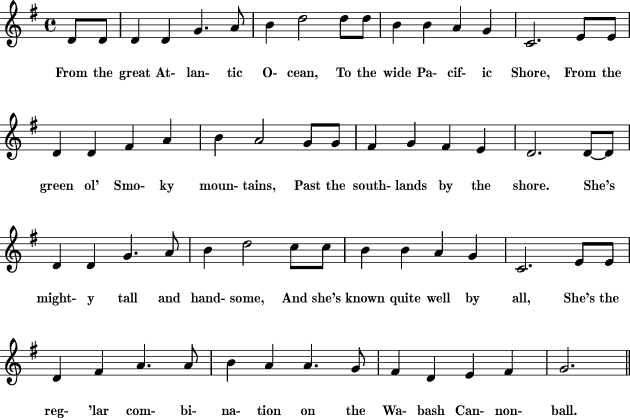Subject: Origins: Wabash Cannonball
From: Joe Offer
This seems to be the seminal thread on "Wabash Cannonball," so I thought I'd add the Traditional Ballad Index entry:
Wabash Cannonball, The
DESCRIPTION: In praise of the amazing Wabash Cannonball, a train which can apparently accomplish anything. The song mentions various places the train visits and the impression it makes on the townsfolk. It may close with a eulogy for "Daddy Claxton"AUTHOR: Original ("TheGreat Rock Island Route") credited to J. A. Roff; rewritten as "Wabash Cannon Ball," perhaps by William Kindt, who copyrighted it; Cohen suspects the rewrite preceded Kindt's 1904 publication, and common tune is not the same as either Roff's or Kindt's
EARLIEST DATE: 1882 (sheet music, as "The Great Rock Island Route"; first use of the "Wabash Cannonball" title is Kindt, in 1904)
KEYWORDS: train railroading travel
FOUND IN: US(SE,So)
REFERENCES (8 citations):
Cohen-LSRail, pp. 373-381, "The Wabash Cannonball" (2 texts, one of them Kindt's, plus a text and sheet music cover of Roff's "The Great Rock Island Route," 1 tune)
Randolph 840, "The Wabash Cannonball" (1 text, 1 tune)
Randolph/Cohen, pp. 385-386, "The Wabash Cannonball" (1 text, 1 tune -- Randolph's 840)
Lomax-FSNA 220, "The Wabash Cannon Ball" (1 text, 1 tune)
Botkin-RailFolklr, p. 462, "The Wabash Cannonball" (1 text, 1 tune)
PSeeger-AFB, p. 85, "Wabash Cannonball" (1 text, 1 tune)
Silber-FSWB, p. 100 "The Wabash Cannonball" (1 text)
DT, WABASHCB*
Roud #4228
RECORDINGS:
Roy Acuff & his Crazy Tennesseeans, "Wabash Cannon Ball" (Vocalion 04466/OKeh 04466/Conqueror 9121. 1938; Columbia 37008, 1946; rec. 1936) [despite the band title, Dynamite Hatcher sang lead on this recording]
Roy Acuff & his Smoky Mountain Boys, "Wabash Cannonball" (Columbia 37008/Columbia 37598/Columbia 20034, 1947) [Note: Some pressings of these issues used the Vocalion/OKeh master listed above]
Loy Bodine, "Wabash Cannon Ball" (Superior 2608. 1931)
Bill Carlisle, "Wabash Cannon Ball" (Decca 5713 [as Bill Carlisle's Kentucky Boys]/Melotone [probably Can.] 45326, 1939)
The Carter Family, "Wabash Cannonball" (Victor 23731, 1932; Montgomery Ward M-7444, 1938; Bluebird B-8350, 1940; rec. 1929)
Clark & Edans, "Wabash Cannonball" (Gennett, unissued, 1928)
Hugh Cross, "Wabash Cannonball" (Columbia 15439-D, 1929)
Delmore Brothers, "The Cannon Ball" (Bluebird B-7991, 1939; rec. 1938)
Roy Hall & his Blue Ridge Entertainers, "Wabash Cannonball" (Vocalion 04717/Conqueror 9230, 1938)
Bill Mooney & his Cactus Twisters, "Wabash Cannonball" (Imperial 1150, n.d.)
Morris Brothers, "Wabash Cannonball - No. 2" (Bluebird B-8252, 1939)
Pete Seeger, "Wabash Cannonball" (on PeteSeeger17)
Art Thieme, "Wabash Cannonball" (on Thieme04)
Doc Watson, "Wabash Cannonball" (on RitchieWatson1, RitchieWatsonCD1, ClassRR)
Mac Wiseman, "Wabash Cannonball" (Dot 1262, 1950s)
CROSS-REFERENCES:
cf. "The Gatesville Cannonball" (tune)
cf. "We Work for Hay and Company" (tune)
cf. "The Boys at Ninety-Five" (tune)
cf. "The Gospel Cannonball" (lyrics)
SAME TUNE:
"Hail! Ye Brave Industrial Workers" (Greenway-AFP, p. 178)
"We Work for Hay and Company" (File: FowL26)
The Grand Coulee Dam (by Woody Guthrie) (Greenway-AFP, pp. 292-293; DT, GRNCOULE)
Delmore Brothers, "New Wabash Cannon Ball Blues" (Bluebird B-8404, 1940)
Delmore Brothers, "Gospel Cannon Ball" (Decca 5970, 1941)
Charles Stowe, "Carolina Cannonball" (on OBanks1)
Boomtown Bill (by Woodie Guthrie) (on Keynote 5000, 1942?; in Archie Green, "Woody's Oil Songs," published in Archie Green, editor, _Songs about Work: Essays in Occupational Culture for Richard A. Reuss_, Folklore Institute, Indiana University, 1993, p. 213)
File: R840
Go to the Ballad Search form
Go to the Ballad Index Song List
Go to the Ballad Index Instructions
Go to the Ballad Index Bibliography or Discography
The Ballad Index Copyright 2016 by Robert B. Waltz and David G. Engle.
The Detroit News reported that the last iteration of the Wabash Cannonball left Fort Street Union Station in Detroit for St. Louis in 1971. But was this Cannonball just a train named after the song, or was there an original Wabash Cannonball train? Well, it does seem there was a Cannonball at about the time the song was written by J.A. Roff in 1882. Here's what the News says:
- A Wabash timetable from 1888, calling the train the Omaha Cannonball, showed a route from St. Louis to Omaha. The name disappeared until an 1893 newspaper advertisement called it the Wabash Cannonball, traveling from Kansas City to St. Louis.
-Joe-
Here are the lyrics we have in the Digital Tradition:
WABASH CANNONBALL
From the great Atlantic ocean to the wide Pacific shore
From the green ol' Smoky mountains to the south lands by the
shore
She's mighty tall and handsome and she's known quite well by all
She's the regular combination on the Wabash Cannonball
Listen to the jingle, the rumble and the roar
As she glides along the woodland through the hills and by the
shore
Hear the mighty rush of the engine, hear the lonesome hoboes call
You're traveling through the jungles on the Wabash Cannonball
Our eastern states are dandy, so the people always say
From New York to St. Louis with Chicago by the way
From the hills of Minnesota where the rippling waters fall
No changes can be taken on the Wabash Cannonball
Now here's to Daddy Claxton, may his name forever stand
And always be remembered through the courts throughout the land
His earthly race is over, now the curtains round him fall
We'll carry him home to victory on the Wabash Cannonball
@train
filename[ WABASHCB
TUNE FILE: WABASHCB
CLICK TO PLAY
SOF
